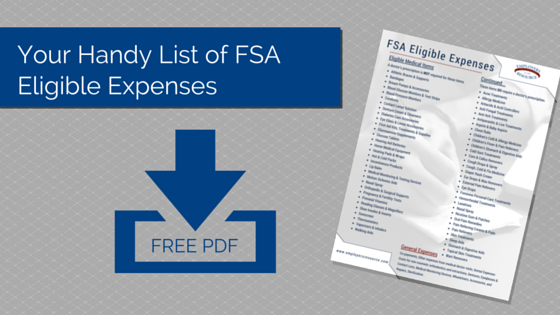Flexible Spending Accounts for Beginners: Everything You Need to Know
Discover the essentials of Flexible Spending Accounts (FSAs) in this comprehensive guide for beginners. Learn how FSAs work, the benefits they offer, and tips for maximizing your contributions to save on healthcare costs. Whether you're new to FSAs or looking to enhance your understanding, this blog provides all the information you need to navigate the world of flexible spending accounts with confidence.

Flexible Spending Accounts (FSAs) can feel a bit puzzling, especially for beginners. With so much information out there, it can be challenging to differentiate between the myths and the facts. This FAQ aims to answer the most common questions about FSAs and provide clarity and understanding to anyone looking to use these accounts effectively.
 ")
")
What is a Flexible Spending Account (FSA)?
A Flexible Spending Account (FSA) is a special savings account that allows employees to set aside pre-tax earnings to pay for eligible medical expenses. Contributions to an FSA are deducted from your paycheck before taxes, which can lower your taxable income. When it comes time to pay for qualified expenses, you can withdraw the money tax-free.
Benefits of FSAs
- Tax Savings: Since contributions are made pre-tax, you save money on income taxes.
- Immediate Access to Funds: When you enroll in an FSA, the total amount you've pledged is available to you from the first day of the plan year.
- Variety of Eligible Expenses: FSAs can be used for a wide range of medical, dental, and vision expenses.
Who is eligible for an FSA?
Typically, most employees who work for an employer that offers an FSA plan can participate. Eligibility varies by employer, so it's essential to check with your HR department. Some exceptions exist; for instance, self-employed individuals are generally not eligible for FSAs.
What types of expenses can I use an FSA for?
FSAs can cover a variety of medical expenses, including:
- Co-pays for doctor visits
- Prescription medications
- Medical supplies
- Dental and vision care costs
The Internal Revenue Service (IRS) provides an extensive list of qualified expenses in IRS Publication 502. It's a good practice to keep receipts for all FSA transactions.

How much can I contribute to an FSA each year?
For 2023, the maximum contribution limit for an FSA is $3,050 per year. However, your employer may set a lower limit. It's worth noting that these limits can change annually, and it’s essential to stay updated with IRS guidelines.
Do I lose my FSA money if I don’t use it?
Many FSAs operate under "use-it-or-lose-it" rules. This means that if you don’t use the money you’ve set aside by the end of the plan year, you will forfeit those funds. However, some employers offer a grace period of up to 2.5 months to use remaining funds, or they may allow a carryover of up to $610 for the next year.
Can I change my FSA contributions during the year?
Typically, once you make an election for your FSA at the beginning of the year, you cannot change your contribution amount unless you experience a qualifying event, such as marriage, divorce, or the birth of a child. Always check your specific FSA policy for any changes.
How does my FSA work with other accounts, like HSAs?
FSAs and Health Savings Accounts (HSAs) are both tax-advantaged accounts, but they come with different rules. If you have an HSA, you are generally ineligible for an FSA unless your employer offers a limited-purpose FSA, which can only be used for dental and vision expenses.
How do I access my FSA funds?
Funds in your FSA are typically accessed via a debit card provided by your employer's FSA administrator. You may also be able to submit reimbursement requests for expenses incurred. However, always check the specifics of your FSA plan as procedures can vary.
What happens to my FSA if I leave my job?
FSAs are tied to your employment. If you leave your job, you will lose access to your FSA, and any unspent funds may be forfeited. Some employers may allow you to use your remaining funds if you have a qualifying event.
Is an FSA worth it?
Absolutely! An FSA can significantly reduce your tax burden and help you manage out-of-pocket medical costs in a tax-advantaged way. However, whether it’s worth it for you personally depends on your anticipated healthcare expenses. Careful planning is essential; consider enrolling if you're likely to have qualifying expenses throughout the year.
Summary of Key Takeaways
Flexible Spending Accounts can be a powerful tool for managing healthcare costs. By understanding the basics—such as what qualifies, contribution limits, eligibility, and how funds are accessed—you can make the most of this benefit. Consider your healthcare needs carefully, and remember to utilize your FSA funds to avoid losing money to the "use-it-or-lose-it" rule. Familiarizing yourself with your employer’s specific FSA policy will also ensure you make informed decisions.
By addressing these common questions, we hope this guide helps you navigate the world of FSAs effectively!
Olivia Rhye
Apr 12, 2025
Jaycee Do is a skilled freelance writer with extensive expertise in medicine, science, technology, and automotive topics. Her passion for storytelling and ability to simplify complex concepts allow her to create engaging content that informs and inspires readers across various fields.
Olivia Rhye
Apr 12, 2025
Jaycee Do is a skilled freelance writer with extensive expertise in medicine, science, technology, and automotive topics. Her passion for storytelling and ability to simplify complex concepts allow her to create engaging content that informs and inspires readers across various fields.
Subscribe to Our Newsletter
Stay updated with our latest articles, reviews, and exclusive offers. Join our community to receive personalized content straight to your inbox.
